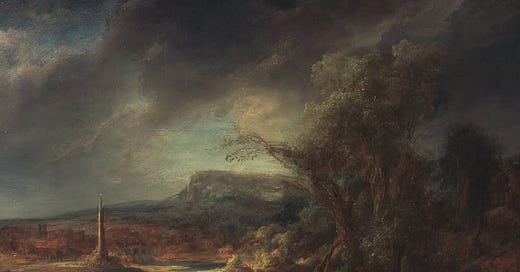Deign at my hands this crown of prayer and praise, Weaved in my low devout melancholy, Thou which of good, hast, yea, art treasury, All changing unchanged Ancient of days; But do not, with a vile crown of frail bays, Reward my Muse's white sincerity, But what Thy thorny crown gained, that give me, A crown of Glory, which doth flower always; The ends crown our works, but Thou crown'st our ends, For, at our end begins our endless rest; The first last end, now zealously possessed, With a strong sober thirst my soul attends. 'Tis time that heart and voice be lifted high, Salvation to all that will is nigh.
So begins La Corona, the famous sequence by 17th-century poet John Donne. In his great work there are a set of seven interconnected poems in which the last line of each becomes the first line of the next. All seven poems are worth reading for their deep insight into the Christian faith, but the first one in particular has really stayed with me. Here, we find Donne utilizing paradox in such a way that demonstrates the sheer power of this poetic device. I want to dive into some of these paradoxes and seek the deeper meaning that lies within.
Deign at my hands this crown of prayer and praise,
Weaved in my low devout melancholy,
Thou which of good has, yea, art treasury,
All changing unchanged Ancient of Days;
Donne starts with an image of God bursting forth into our lowly position. As we find ourselves devoted to melancholy and hopelessness, the Creator of Heaven and Earth unexpectedly steps into our world. Donne rightly expresses utter surprise at this beautiful reality, wondering how such a Treasury of Good could be granted to so poor a soul. Why are we to receive a crown of prayer and praise when we deserve to be left to our own ways? The first paradox reveals the answer: because the Great Unchanging God is the Great Changer. Although God Himself does not change, he changes everything. In a very real sense, God has disrupted our world and our lives. Like he disrupted the formless void by creating a good world, so he interrupts the darkness of our life and grants light anew. The philosophers spoke of God as the Prime Mover, the Dynamic One, the Pure Act1—they all, with frailty of language, have tried to convey the deepness of our God’s unchanging, unmixed life of change. With this insight, Donne reminds us to steer away from viewing God as static—no, He is Life Abundant.
But do not, with a vile crown of frail bays,
Reward my Muse’s white sincerity,
But what Thy thorny crown gained, that give me,
A crown of Glory, which doth flower always;
The full expression of God entering our world is rooted in the Incarnation. Donne skillfully plays with the word “crown” as a form of mediation upon the rewards that the Word-Made-Flesh achieved for us. He first interacts with the reader by humbly begging us not to crown him with a lesser worldly glory because of his poetic skill. He notes that this type of praise fades. By imaging forth a crown that has frail bay leaves, he demonstrates that this kind of “reward” does not have substance, but instead fades to non-being, like a flower that fades at the end of its season. Donne seeks a better flower: one that is life in fullness, never fading, always growing. Paradoxically, this flowered crown was earned by Christ, who donned not a crown of flowers, but of thorns.
The end crowns our works, but Thou crown’st our ends,
For, at our end begins our endless rest;
The first last end, now zealously possessed,
With a strong sober thirst my soul attends.
Donne finishes his crown analogies with another paradox. This one finds the poet reflecting on the telos of all humanity. This ever-flowering crown finds its foundation in the Beatific Vision where at our end, we will find endless rest. The hope of glory that we now possess, is brought to ultimate fulfillment as our restless hearts are finally brought to great repose in Christ.2 There is beauty in the weight of the final line of this section. Donne’s soul seeks this fulfillment with a “strong sober thirst.” This is not a drunken desire—irrational and disordered—but a sober-minded longing embedded in us by our Creator. It is a thirst that reaches out for and seeks after the healing found in the Water of Life: the only stream that can truly quench the soul, for it flows from our Final Cause.
‘Tis time that heart and voice be lifted high,
Salvation to all that will is nigh.
Climactically, this meditation on the riches of Christ wells up in Donne’s heart so powerfully that he cannot help but break forth in the declaration: salvation is here! Surely this should be the response of us all. May we become heralds of the beauty that has so touched our souls and so transformed our disposition that we cannot help but spend our lives pointing to the One who wore the crown of death in order to grant us the unfading crown that forever flowers.
Primarily from Aristotle and Aquinas
“Our hearts are restless until they rest in you.” - Augustine





